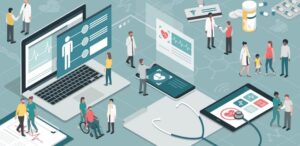The future of medical apps in Europe

The healthcare system has evolved to the point that in a near future, almost everything needed to solve our care and accessibility problems will be at our fingertips. At the click of a button, or on our cell phones. Health applications are becoming a fundamental part of our phones and thanks to the digital transformation in this sector. As a result of the pandemic, many initiatives have emerged around these new applications with the aim of avoiding crowds and speeding up processes such as teleconsultations and medical records. In Spain, for example, CoronaMadrid and COVID-19 Assistance were initially developed to contain the demand.
Germany came to revolutionize this industry by developing the DiGA (digitalen Gesundheitsanwendungen) strategy for the prescription to patients of digital applications reimbursable by health insurance. In 2019, in conjunction with parliament’s passage of the Digital Delivery Act – Digitale-Versorgung-Gesetz (DVG), they began to create an ecosystem by which they seek to digitally transform the German healthcare system. What is a DiGA? It is a digital health application with two characteristics: 1) to be certified as a “medical device” and 2) that its main functionality is digital technology. DiGA can only be used by the patient or the healthcare provider. Applications used by physicians are NOT DiGA. The legislation enables the standardization and homologation of medical software with web applications, cloud services and consultation with professionals. The Federal Institute for Drugs and Medical Devices (BfArM) has created a certification process in order to enable all of the above. These health apps are available to professionals for prescription in consultation and are reimbursed to service providers through insurers in Germany as if we were talking about another medicine. As they are certified applications, the medical treatments are paid for by the country’s insurance companies. There are actions for multiple pathologies, such as agoraphobia, insomnia, and obesity, among others. These are called Digital Therapies or DTx. But they must meet requirements related to security and data protection in a conclusive way.
Spain, in the coming years, will set the trend and pave the way for similar healthcare systems such as the DTx Consortium. This is the first multi-sector alliance that focuses primarily on driving the implementation of digital therapies in the Spanish healthcare system. This HUB, emerges thanks to the lack of accessibility in terms of therapeutic innovations in digital treatments. Its mission is to transform health services through the adoption of digital therapies to improve clinical outcomes to optimize the health system. Some of the members of this consortium are Bayer, Angelino Pharma Spain, Pfizer Spain, Barcelona Health Hub, IESE Business School, Opinno, among many more members.
In the near future, we will surely find digitized therapies and treatments for all types of diseases, without the need for frequent face-to-face consultations, and all within reach of our cell phones, thanks to a complete offer that provides all the health services that can be found within a hospital.




